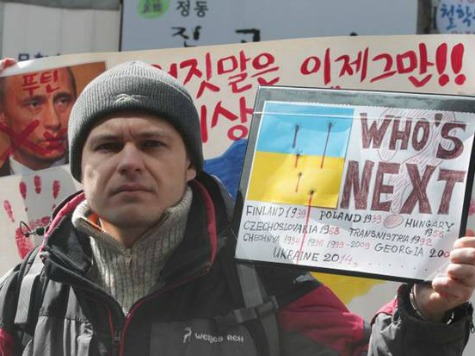
A few days ago, after my first ever interview with Breibart’s Steve Bannon, I wrote a short piece for the site on why America should care about Ukraine.
I had never had to summarize a serious geostrategic issue in less than 300 words. (Being a professor of irregular warfare for the Defense Department, 3,000 words is more my style).
As soon as the piece was up comments started flooding in. Many were just angry rants which were clearly written by people who hadn’t read the piece properly and who seemed to think I’m just another interventionist neocon, when nothing in my article spoke to the need for a military response at all.
But so many of the responses were from hard core isolationists that I feel I have to react, since they really do not seem to understand what is special about our nation. In fact, another Breitbart piece on the crisis included the following claim: “It is important to point out that the U.S. has ZERO national interest in this matter.” Really?
Did America have “zero national interest” in the matter when a bunch of ideologues stormed the Winter Palace in St. Petersburg in 1917? Did we have zero national interest in the matter when the Chancellor of Germany annexed Austria and the Sudetenland in 1938? Did we have zero national interest when the Soviets left Afghanistan in 1989 and the Taleban took over the government in Kabul?
I fear all those isolationists who took umbrage at my initial piece would have said yes in 1917, yes in 1938, and yes in 1989. They would have been completely and utterly wrong.
The revolution that created the Soviet Union; the events that would lead to the Third Reich expanding into all of continental Europe; and the creation of a Jihadi state in Afghanistan that would become the home for Al Qaeda, would all directly effect the national interests of the United States. And that was in a far less interconnected world than today.
I get it. George Bush messed up in Iraq, and we’ve got enough problems at home what with the NSA and Obamacare. But none of that means that we can just pull down the blinds on the Atlantic and Pacific coast and ignore the world. Because the world will not ignore us.
More importantly, if you believe in American exceptionalism, then you should care about Ukraine too. American exceptionalism isn’t simply about freedom and a good life for you and me. It’s about what we believe in and a faith that our values are objective.
This means that if there is a country out there, most of whose citizens say they want to be free like us and have a government by the people and for the people, if a more powerful thug comes along and denies them their inalienable rights, we mustn’t ignore them. If we do, other thugs will take notice.
That’s how Pearl Harbor and 9/11 happened. We showed weakness, and people who hated what we stood for took notice and then they decided we were next.
In January 1983, President Ronald Reagan signed a then-secret National Security Decision Direction (NSPD7 5) on US relations with Moscow that has since been declassified. It was in response to actions by the Kremlin in Eastern Europe that were far less egregious than those Putin has just taken in Ukraine.
The president then made it clear that “the U.S. must convey clearly to Moscow that unacceptable behavior will incur costs that would outweigh any gain” by the Kremlin. Imagine what he would say — and do — today. I know one thing for certain. He would not say that we have “zero interest” in the freedom of the people of Ukraine.
Sebastian Gorka PhD is Associate Dean and Associate Professor of War and Conflict Studies at National Defense University, Washington, and an Associate Fellow of SOCOM’s Joint Special Operations University.

COMMENTS
Please let us know if you're having issues with commenting.